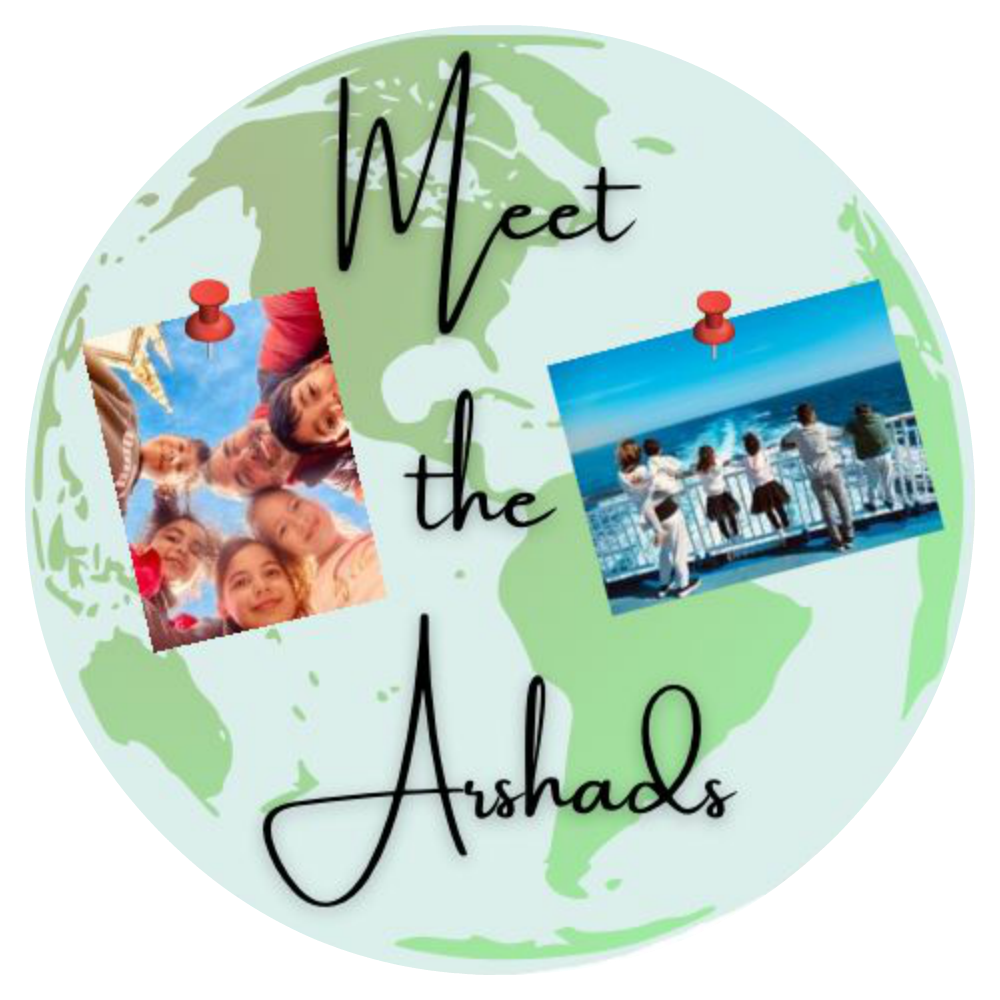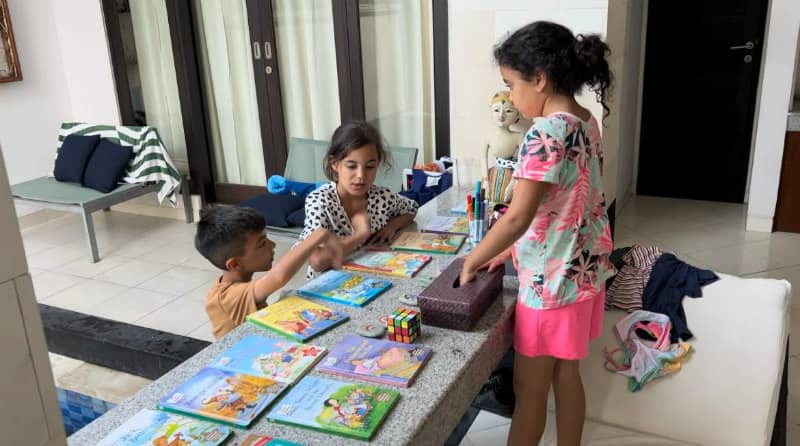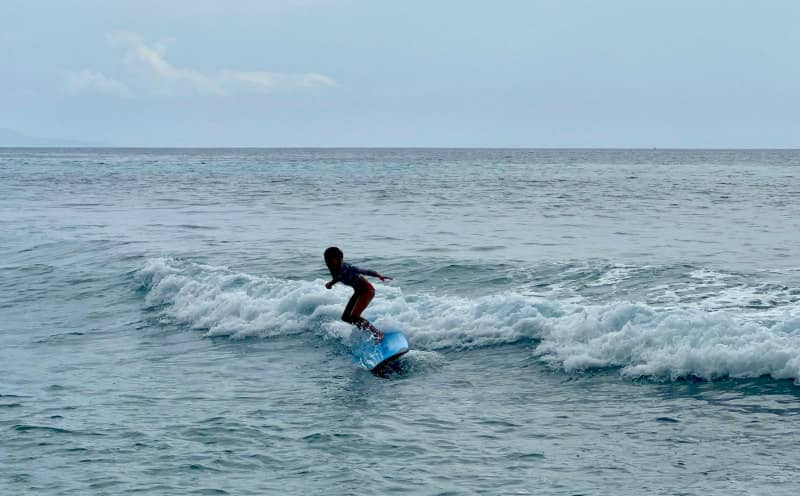This is a comprehensive guide for homeschooling families who want to embark on long term international travel and become a worldschooling family. It’s mainly based on our own journey as a family. What we have learned and also from other like minded families we have shared time with along the way.
Embarking on long-term international travel as a homeschooling family is an exciting and life-changing adventure. It offers so many opportunities for experiential learning, cultural immersion, and family bonding. We would have struggled to experience all this if we had stayed in our standard life routine in the UK. 9 - 5 Mon to Fri, kids in school, etc.
However, becoming a worldschooling family requires meticulous planning and preparation. We hope this guide will walk you through most of the stuff you need to consider before leaving home and also during your travels.
Preparing Before You Leave
Declutter and Simplify Your Life
- Minimise possessions: Begin by decluttering your home and minimising your possessions. This process will make it easier to rent or sell your home and reduce storage costs. Consider donating, selling, or storing items that aren’t essential.
- Reduce responsibilities and commitments: Pause or end ongoing commitments that tie you to your current location, such as local memberships, volunteer work, and subscriptions. Consider automating essential bill payments and other necessary tasks.
- Home management: If you own your home, decide whether to rent it out, sell it, or leave it vacant. Arrange for someone trustworthy to manage the property in your absence, including handling mail, maintenance, and emergencies.
Planning Your Travel
- Choosing destinations: Research destinations considering factors like affordability, safety, climate, cultural attractions, and the availability of worldschooling communities. Prioritise countries with a lower cost of living to stretch your travel budget further.
- Join worldschooling communities: Connect with other worldschooling families online through forums, social media groups, and dedicated platforms. These communities can offer advice, support, and the chance to meet up with like-minded families during your travels. One community we know is doing really well in SE Asia right now is Bliss Hubs. Click here for more info
- Itinerary planning: Create a flexible itinerary that includes a mix of educational experiences, cultural immersion, and leisure time. Consider the interests of all family members when planning activities and locations.
Financial Planning
- Budgeting: Create a detailed travel budget that accounts for accommodation, transportation, food, clothing, activities, health insurance, and emergency funds. Research the cost of living in your target destinations to help with accurate budgeting. You can find so much helpful info from other worldschooling families who have been on their travels for a while now. Useful sources for this info include social media FB groups, travel blogs and YouTube. As a family, we have been travelling SE Asia for over 2 years and tracked all of our costs. We produced this useful video which gives our account of what those costs look like vs our old UK life. Check it out:
- Income streams: Plan how you’ll fund your travels. Is it going to be from savings or liquidating assets (property, cars, shares)? Many worldschooling families earn income whilst they travel as digital nomads through freelancing, remote work, or online businesses. Explore opportunities in areas like writing, consulting, teaching, or e-commerce. If you plan to travel with no end date, this is a very important consideration.`
- Financial management: Set up online banking or make sure your banking is accessible from abroad. Make sure you have a robust and secure system for managing finances on the road. Consider using a combination of debit/credit cards, digital wallets, and local bank accounts in the countries you visit. Always be conscious of fees that are charged for purchases and cash withdrawals as these can all add up. You can normally find zero fee cards in your home country. Make sure you have these accounts opened and ready before you leave For security, It’s advisable to purchase a reputable VPN subscription for all the tech where you will be accessing sensitive data. There are plenty of providers out there, we use ExpressVPN.
Administrative Preparations
- Passports: Ensure all family members have valid passports with at least six months of validity remaining. If they have only got 6 - 12 months left, I would advise on getting them renewed depending on how long you plan to travel. Whilst it’s not impossible to get your passport renewed whilst abroad, it’s more risky and costly to do so.
- Visas: Research visa requirements for each destination you plan to visit if possible. Whilst some countries issue visas on arrival, others don’t and you have to apply well in advance. Some countries offer special long-stay visas for homeschooling families or digital nomads. These could also be worth considering. Be careful not to overstay on your visa period. Some countries have zero tolerance here and you can get in trouble (financial penalties or worse).
- Travel insurance: Obtain comprehensive travel insurance that covers health, accidents, and emergencies. Consider plans that include coverage for adventure activities, which you and your children might engage in during your travels. The type if policy you need is not available through most insurance providers as it’s classified as long term continuous travel. Companies such as World Nomads and Safety Wings offer the policy type you need for this trip.
- Vaccinations and health preparations: Research is key for this. There will be universal advice on vaccinations or medications for the regions you’ll visit. They normally fall into two brackets: Essential or Optional. Rarely does a country say that a vaccination is mandatory before entering. This is a tricky one as vaccinations are not cheap if you are unfortunate not to be able to get them free within your healthcare system. If you can afford them, it’s worthwhile for peace of mind. If you can’t afford them all, then pay for some if not all of the essential ones. But we do know a lot of families that didn’t bother withe them and took a risk. Don’t forget to carry a well-stocked first aid kit, and consider any special health needs your family members might have.
Packing
- Packing for long-term travel: Pack light, focusing on versatile, weather-appropriate clothing, essential electronics, and homeschooling materials. Use packing cubes or compression bags to maximise space and keep your luggage organised.
- Travel documents: Keep digital and physical copies of important documents. Including passports, visas, insurance policies, and medical records. Store these in a secure, easily accessible place.
- Travel gear: Invest in high-quality luggage, backpacks, and travel accessories that can withstand long-term use. Consider using backpacks for hands-free travel, especially when moving between destinations.
We have recently written a detailed blog on planning and packing for long term travel.
During Your Travels
Settling in Each New Location
- Cultural adjustment: Embrace the culture of each new location by learning the key words and phases of the local language and get to know the local customs and traditions. This helps reduce culture shock, helps you get to know the locals better and enhances the educational experience for your children.
- Finding accommodation: This paragraph could easily be in the ‘preparing before you leave’ section but you will also be finding and booking accommodation as you travel. Use platforms like Airbnb, Booking.com, or local real estate websites to find family-friendly accommodations. Consider long-term rentals for stays longer than a month, which can be more cost-effective. You can find better deals away from the big accommodation platforms using sites like Facebook Marketplace.
- Safety considerations: Familiarise yourself with local safety guidelines, healthcare facilities, and emergency contact numbers. Teach your children basic safety measures, like recognising safe places and understanding local traffic rules. For more info on travelling safely with children, check out our blog by clicking here
Worldschooling on the Road
- Curriculum planning: Worldschooling offers the flexibility to blend traditional academics with experiential learning. Utilise online resources, educational apps, and worldschooling curriculum guides to keep your children’s education on track. There is no text book for this. You just have to try different things until you get closer to the best formula for you and your children. We talk a lot more about this on our worldschooling blogs. Click here to read more about our time trying to make worldschooling work for us
- Integrating local culture: Incorporate local history, geography, and culture into your homeschooling. Visit museums, historical sites, and natural wonders to provide context for what your children are learning.
- Socialization and community: Actively seek out homeschooling groups or international schools where your children can interact with peers. Join local activities, classes, or sports clubs to integrate into the community. We found Bliss Hubs does exactly all of this and its free. We love them. We had the best time at a Bliss Hub in Koh Lanta. Click here to see more info
Maintaining Health and Well-Being
- Physical health: Stay active by exploring your surroundings on foot or by bike, and engage in physical activities that are part of the local culture, such as yoga, martial arts, or dance. Maintain a balanced diet by cooking at home when possible and sampling local foods.
- Mental health: Long-term travel can be mentally exhausting. Ensure everyone has downtime and access to activities that help them relax, such as reading, journaling, or meditating. Check in regularly with each family member to address any concerns or homesickness.
- Healthcare access: Research healthcare facilities in each new location. In case of emergencies, know where the nearest hospital or clinic is and how to contact local emergency services.
Managing Finances on the Road
- Tracking expenses: Use budgeting apps to track your daily expenses and ensure you stay within your budget. Adjust your spending habits based on the cost of living in each new country.
- Currency management: Keep an eye on exchange rates and consider using multi-currency accounts or travel cards that offer competitive rates and low fees. Withdraw cash in the local currency to avoid high conversion fees.
- Saving on costs: Save money by cooking meals at home, choosing budget-friendly accommodations, and taking advantage of free or low-cost local activities. Utilise travel rewards programs to reduce transportation and lodging costs.
Building and Maintaining Connections
- Networking with worldschoolers: Continue connecting with worldschooling families you meet along the way. Share experiences, resources, and tips, and consider travelling together for certain portions of your journey.
- Staying in touch with family and friends: Regularly update your loved ones on your travels through social media, blogs, or video calls. This helps maintain strong ties and allows others to share in your journey.
Additional Considerations
Emergency Preparedness
- Contingency plans: Have a plan in place for emergencies, such as natural disasters, political unrest, or sudden health issues. Keep emergency contact information and a list of local embassies or consulates handy.
- Evacuation Insurance: Consider purchasing evacuation insurance, which covers the cost of emergency transport back to your home country in case of serious illness or injury.
Legal and Educational Compliance
- Homeschooling regulations: Research the homeschooling laws in your home country and any countries you plan to visit. Some countries may require specific documentation or approval to homeschool.
- Record keeping: Maintain detailed records of your children’s educational progress, including lesson plans, completed work, and assessments. This may be necessary for legal compliance or if you decide to re-enroll your children in a traditional school later on.
Returning Home
- Reintegration plan: If you plan to return home after your travels, consider how you’ll reintegrate into your home community. This includes resuming any paused commitments, re-enrolling your children in school (if applicable), and adjusting back to a more stationary lifestyle.
- Reverse culture shock: Be prepared for reverse culture shock. It is real! It happened to us when returning to our home country after a long period abroad. Ease the transition by maintaining some of the habits and routines you developed during your travels.
Final Tips and Guidance
- Stay flexible: Plans can change unexpectedly, so embrace flexibility and adapt to new situations. This mindset will help you handle challenges with ease.
- Document your journey: Keep a travel journal, blog, or vlog to document your experiences. This serves as a keepsake and can also inspire other families considering worldschooling.
- Embrace the unknown: Worldschooling is about exploring the world and learning from the unexpected. Encourage your children to be curious, open-minded, and resilient in the face of new experiences.
By carefully preparing and maintaining a balanced approach, your homeschooling family can successfully embark on long-term international travel, creating unforgettable memories and a unique educational experience for your children.
Good luck! And if you have any questions, feel free to email us at meetthearshads7@gmail.com







